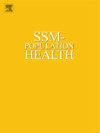Effects of refundable state earned income tax credits on access to medical and dental services of low-income mothers
IF 3.1
2区 医学
Q1 PUBLIC, ENVIRONMENTAL & OCCUPATIONAL HEALTH
引用次数: 0
Abstract
Background
Low-income women face constraints to timely access to medical and dental services. There is little evidence on whether refundable state earned income tax credit (EITC) programs affect access to care. We examine the effects of refundable state EITC levels on accessing medical and dental care among low-income mothers and potential interactions with state Medicaid eligibility levels.
Methods
We use data from 1996-2019 Behavioral Risk Factor Surveillance System (BRFSS). We focus on single mothers aged 18–44 with high school or less education and two or more children as the group that receives the most EITC payments, but also consider other subgroups. We consider the timing of EITC disbursement relative to interview month and outcome measurement. The regression analysis adjusts for state time-invariant differences, national time trends, and several individual-level and state time-varying covariates.
Results
There is little evidence that higher refundable state EITC affects access to medical and dental services among low-income mothers including among the group mostly likely to benefit from this policy. A small improvement in dental visits and decrease in forgone medical visits are observed in some models. However, these results are sensitive to the timing of EITC measure and included interview months. Moreover, some effects are observed among subgroups less exposed to EITC. There is also no evidence that EITC effects differ by state Medicaid eligibility.
Conclusion
The overall small payments from refundable state EITC do not appear to impact medical and dental care access of low-income mothers. Further research to understand potential individual-level heterogeneity by EITC amounts and timing relative to health care needs is important.
可退还的国家所得税抵免对低收入母亲获得医疗和牙科服务的影响
背景低收入妇女在及时获得医疗和牙科服务方面面临限制。几乎没有证据表明可退还的州劳动所得税抵免(EITC)计划是否会影响获得医疗服务的机会。我们研究了可退还的州EITC水平对低收入母亲获得医疗和牙科护理的影响,以及与州医疗补助资格水平的潜在相互作用。方法使用1996-2019年行为风险因素监测系统(BRFSS)数据。我们关注的是年龄在18-44岁、受过高中或更低教育、有两个或更多孩子的单身母亲,他们是获得EITC支付最多的群体,但也考虑了其他子群体。我们考虑了EITC支付的时间与面试月份和结果测量相关。回归分析调整了州时不变差异,国家时间趋势,以及几个个人水平和州时变协变量。结果:几乎没有证据表明,更高的可退还国家EITC会影响低收入母亲获得医疗和牙科服务的机会,包括最有可能从这项政策中受益的群体。在一些模型中观察到,牙科就诊的情况略有改善,放弃医疗就诊的情况有所减少。然而,这些结果对EITC测量的时间和面试月份敏感。此外,在较少暴露于EITC的亚组中观察到一些影响。也没有证据表明EITC的效果因州的医疗补助资格而异。结论可退还国家EITC的小额支付总体上不会影响低收入母亲获得医疗和牙科保健的机会。进一步研究了解EITC金额和时间与医疗保健需求的潜在个体水平异质性是很重要的。
本文章由计算机程序翻译,如有差异,请以英文原文为准。
求助全文
约1分钟内获得全文
求助全文
来源期刊

Ssm-Population Health
PUBLIC, ENVIRONMENTAL & OCCUPATIONAL HEALTH-
CiteScore
6.50
自引率
2.10%
发文量
298
审稿时长
101 days
期刊介绍:
SSM - Population Health. The new online only, open access, peer reviewed journal in all areas relating Social Science research to population health. SSM - Population Health shares the same Editors-in Chief and general approach to manuscripts as its sister journal, Social Science & Medicine. The journal takes a broad approach to the field especially welcoming interdisciplinary papers from across the Social Sciences and allied areas. SSM - Population Health offers an alternative outlet for work which might not be considered, or is classed as ''out of scope'' elsewhere, and prioritizes fast peer review and publication to the benefit of authors and readers. The journal welcomes all types of paper from traditional primary research articles, replication studies, short communications, methodological studies, instrument validation, opinion pieces, literature reviews, etc. SSM - Population Health also offers the opportunity to publish special issues or sections to reflect current interest and research in topical or developing areas. The journal fully supports authors wanting to present their research in an innovative fashion though the use of multimedia formats.
 求助内容:
求助内容: 应助结果提醒方式:
应助结果提醒方式:


